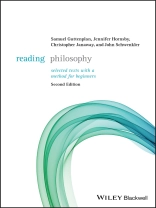A key introductory philosophy textbook, making use of an innovative, interactive technique for reading philosophical texts
Reading Philosophy: Selected Texts with a Method for Beginners, Second Edition, provides a unique approach to reading philosophy, requiring students to engage with material as they read. It contains carefully selected texts, commentaries on those texts, and questions for the reader to think about as they read. It serves as starting points for both classroom discussion and independent study. The texts cover a wide range of topics drawn from diverse areas of philosophical investigation, ranging over ethics, metaphysics, epistemology, philosophy of mind, aesthetics, and political philosophy.
This edition has been updated and expanded. New chapters discuss the moral significance of friendship and love, the subjective nature of consciousness and the ways that science might explore conscious experience. And there are new texts and commentary in chapters on doubt, self and moral dilemmas.
* Guides readers through the experience of active, engaged philosophical reading
* Presents significant texts, contextualized for newcomers to philosophy
* Includes writings by philosophers from antiquity to the late 20th-century
* Contains commentary that provides the context and background necessary for discussion and argument
* Prompts readers to think through specific questions and to reach their own conclusions
This book is an ideal resource for beginning students in philosophy, as well as for anyone wishing to engage with the subject on their own.
İçerik tablosu
Preface
University of London External Programme
Sources and Acknowledgements
Introduction
1 Doubt
Introduction to the Problem
Introduction to Descartes
René Descartes, ‘First Meditation’
Commentary on Descartes
2 Self
Introduction to the Problem
Introduction to Descartes
René Descartes, ‘Second Meditation’ (extract)
Commentary on Descartes
Introduction to Strawson
P. F. Strawson, ‘Self, Mind and Body’
Commentary on Strawson
3 Tragedy
Introduction to the Problem
Introduction to Hume
David Hume, ‘Of Tragedy’
Commentary on Hume
Introduction to Feagin
Susan L. Feagin, ‘The Pleasures of Tragedy’
Commentary on Feagin
4 Dilemma
Introduction to the Problem
Introduction to Lemmon
E. J. Lemmon, ‘Moral Dilemmas’ (extract)
Commentary on Lemmon
Introduction to Mill
John Stuart Mill, Utilitarianism (extracts)
Commentary on Mill
5 Friendship
Introduction to the Problem
Introduction to Aristotle
Aristotle, Nicomachean Ethics, Book VIII (Extracts)
Commentary on Aristotle
Introduction to Stroud
Commentary on Stroud
6 Equality
Introduction to the Problem
Introduction to Williams
Bernard Williams, ‘The Idea of Equality’
Commentary on Williams
Introduction to Nozick
Robert Nozick, Anarchy, State and Utopia (extracts)
Commentary on Nozick
7 Identity
Introduction to the Problem
Introduction to Locke
John Locke, An Essay Concerning Human Understanding (extracts)
Commentary on Locke
Introduction to Williams
Bernard Williams, ‘The Self and the Future’
Commentary on Williams
8 Freedom
Introduction to the Problem
Introduction to Schopenhauer
Arthur Schopenhauer, Prize Essay on the Freedom of the Will (extracts)
Commentary on Schopenhauer
Introduction to Strawson
P. F. Strawson, ‘Freedom and Resentment’ (extract)
Commentary on Strawson
9 Consciousness
Introduction to the Problem
Introduction to Nagel
Thomas Nagel, ‘What Is it Like to Be a Bat?’ (Extracts)
Commentary on Nagel
Introduction to Churchland
Commentary on Churchland
10 Causality
Introduction to the Problem
Introduction to Hume
David Hume, A Treatise of Human Nature (extracts)
Commentary on Hume
Introduction to Anscombe
G. E. M. Anscombe, ‘Causality and Determination’ (extract)
Commentary on Anscombe
11 Qualities
Introduction to Some Problems
Introduction to Boyle and Locke
Robert Boyle, The Origin of Forms and Qualities (extracts)
Commentary on Boyle
John Locke, An Essay Concerning Human Understanding (extract)
Commentary on Locke
Introduction to Berkeley
George Berkeley, The Principles of Human Knowledge and Three Dialogues Between Hylas and Philonous (extracts)
Commentary on Berkeley
Further Questions
Essay/Examination Questions
Further Reading
Index
Yazar hakkında
Samuel Guttenplan is Emeritus Professor of Philosophy at Birkbeck, University of London, retiring after nearly 35 years in Birkbeck’s philosophy department. Professor Guttenplan was the founding Executive Editor of the interdisciplinary journal Mind & Languagein 1986 and he served in that capacity for five and then sixteen years from 2000, continuing now as an Editor. His research interests include the philosophies of mind, language, philosophical logic, and ethics.
Jennifer Hornsby is Professor of Philosophy at Birkbeck, University of London. She is Emeritus Fellow of Corpus Christi College, Oxford, and a Fellow of the Norwegian Academy of Science and Letters, of the British Academy, and of the American Academy of Arts and Sciences.
Christopher Janaway is Professor of Philosophy at the University of Southampton. He is general editor of the Cambridge Edition of the Works of Schopenhauer, and has published widely in the history of philosophy, particularly on Schopenhauer and Nietzsche, and in aesthetics.
John Schwenkler is Professor in the Department of Philosophy at Florida State University. He is the author of Anscombe’s ‘Intention’: A Guide. Professor Schwenkler’s research is in the philosophy of mind and action, ethics, epistemology, and cognitive science.












